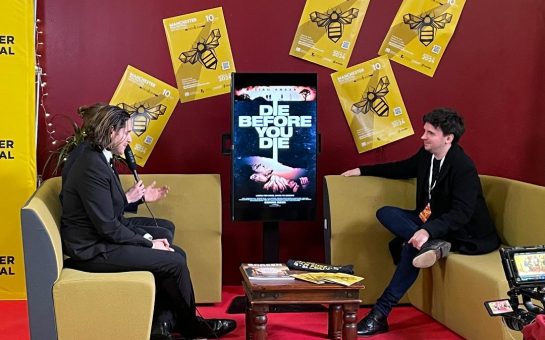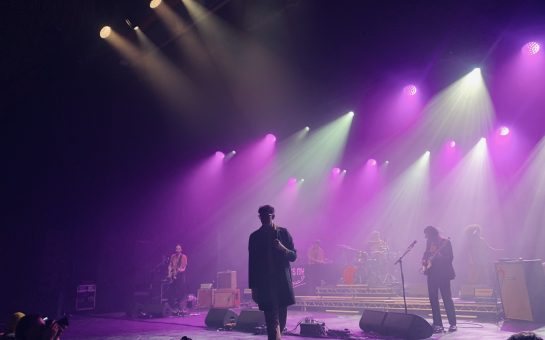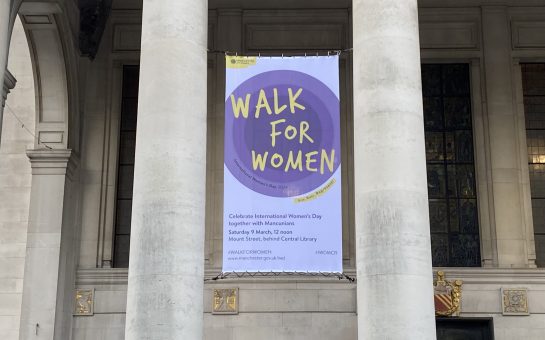A feminist film festival has launched in Manchester this week with a new historical drama that brings the fight for gender equality into the modern world.
The Time Is Now is a new season of film screenings across the country on the theme of ‘women’s rights and women’s fights’.
It is timed to coincide with the release of Suffragette and Malala Yousafazai documentary He Named Me Malala.
HOME cinema in Manchester are getting involved, with the event ‘Make More Noise! Suffragettes in Silent Film’ and screenings of the 1913 silent film Die Suffragette, and Iranian football film Offside.
Suffragette begins in 1912, with heroine Maude Watts (Carey Mulligan) working long hours at a laundry service and coming home to keep house for her husband Sonny (Ben Whishaw) and their young son.
One day, she is out on an errand when a riot breaks out, as women around her begin smashing shop windows and screaming ‘Votes for Women!’
There’s change in the air as women across Britain begin fighting for their rights.
Suffragette seeks to do for the battle for women’s right to vote in Britain what last year’s Selma did for black people’s right to vote in the USA; to bring black-and-white photographs in history textbooks into colour and life.
Both films remind contemporary audiences that the rights we take for granted weren’t won by polite debate, but by hard struggle against an oppressive state and great personal sacrifice.
Suffragette is made with a great eye for period detail.
Everything, from the crowded London streets to the hellish laundry service that has become Maud’s prison and evokes the labyrinthine factories in the famous silent film Metropolis, seems as real as if you were there.
As well as having almost all the main roles played by women, the film was made by women.
It was directed by Sarah Gavron (Brick Lane) and written by Abi Morgan, the screenwriter behind Margaret Thatcher biopic The Iron Lady as well as BBC journalism drama The Hour.
The huge number of women behind the film explains its strong focus on the authentic details of women’s lives that aren’t shown in film enough.
There are some shocking scenes that use small moments to show how endemic sexism is in the world of the film.
When Maud’s activist friend Violet Miller (Anne-Marie Duff) is told she can’t testify before a parliamentary committee because her husband has just beaten her and the bruises on her face reflect badly on her, not him.
Such scenes feel urgently contemporary, reminding audiences that civil rights such as voting are the first step to reforming an unjust society.
The Time Is Now season was created to build on the current ‘fourth wave’ of feminism.
For many young women watching the film, Maud’s experiences of exploitation and abuse will seem too real to be history.
It’s appropriate that domestic violence protesters disrupted Suffragette’s London premier, reminding us that the issues its characters face are still relevant today.
However, the film seems unsure how to handle a subplot implying that Maud was sexually abused as a child.
It’s a bleak illustration of how powerless she is, but the writing wavers uncertainly between melodrama and vagueness in dealing with the subject matter.
Carey Mulligan, in her biggest role since her breakthrough in An Education, brings a powerful emotional impact to Maud’s journey from drudgery to radicalism.
Since we know from Suffragette’s title how it’s going to end, the opening scenes feel predictable as they show her growing involvement in the suffragette movement as she’s introduced by Violet and pharmacist Edith Ellyn (Helena Bonham Carter).
The film becomes more compelling once we see the costs of her activism.
Kindly Sonny rapidly turns on his wife once she begins to defy him, and Maud’s relationship with police inspector Arthur Steed (Brendan Gleeson), who spies on the suffragettes as he used to do Irish nationalists, is the most tense and intriguing in the film, showing the dawn of the modern surveillance state.
Suffragette was criticised for excluding women of colour from its vision of feminism after a badly-judged photo shoot where the entirely white cast posed in T-shirts with the Emmeline Pankhurst quote ‘I’d rather be a rebel than a slave’.
It’s a shame that the people behind the photo shoot don’t seem to have seen the film, since it does explore how women from different backgrounds have different experiences of feminism.
The suffragette struggle is disproportionately hard for working-class women like Maud and Violet, who lack any familiar support or financial security.
Suffragette is a good film that could have been great if it had given more space to scenes like this, which explore the cost of giving everything for a cause you believe in.
Instead, it sometimes focuses too much on exposition and inspirational speeches about the characters’ devotion to the struggle.
It’s a shame that such a strong cast, featuring some of the best actors working today, are hobbled with some artificial-sounding dialogue.
However, the story Suffragette tells is still urgent and important.
It will leave you thinking about how tough the fight for women’s rights was and how much remains to be done.
To find out more about The Time Is Now and contribute your own content, visit www.ttin.uk.
Image courtesy of Movieclips Trailers via. YouTube, with thanks.



